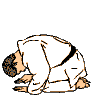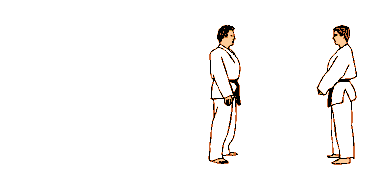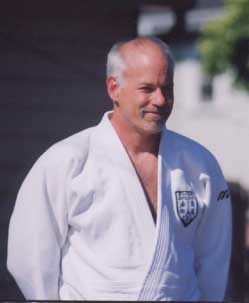 By Neil Ohlenkamp |
The term sensei includes several levels of meaning. Some martial artists equate it with "master", but this is a meaning that is not used much in Judo circles. As you advance in Judo it becomes very apparent that there are so many techniques and aspects of Judo that it would take a lifetime to learn them all. Mastery seems to stay just out of reach, and it is not something that can easily be achieved or claimed. There are moments of mastery, like when a competitor achieves the elusive effortless ippon (win), but they are fleeting. There is always more to learn, and Judo teachers are usually the first to admit that they are more like beginners than masters.
The Japanese word sensei literally means "one who has gone before". This is another way to look at the role of a sensei, and one that I especially identify with. In terms of a martial art, a sensei is the one with more experience who can guide you along the path. My sensei competed extensively and knew what it was like to win and lose. Having demonstrated the required techniques to go through each of the ranks he was competent to help others along the same path. Having studied other martial arts he had an appreciation for the unique lessons of Judo. Being head coach of a large Judo club he saw a lot of students struggling to achieve their best. Having coached winning athletes he knew what it took to be successful. Sharing this knowledge and experience with others is what a sensei is all about. Over the years I have seen how wonderful Judo is from the perspective of a kid and an adult, a beginner, an intermediate student, a tournament competitor, a tournament official, a new teacher, a club head instructor, and an international team coach. I have practiced or taught Judo in Asia, Europe, Central America, and throughout the United States. These experiences have enriched my life, and I share them freely, both as an instructor in the Encino Judo Club and as host of the most popular online Judo dojo, the Judo Information Site, where I have provided information about Judo to millions of visitors.
In approaching these subjects I humbly do so as "one who has gone before", sharing lessons I have learned, and discussing many that I am still studying and striving to understand. I will never come close to describing all the different ways that Judo can be fulfilling, and I do not know everything about Judo, so I would love to hear your feedback, stories, questions, differing opinions, and article ideas. If you have a different perspective that you think should be shared, write an article and send it to me so I can put it online. Thanks for visiting the Judo Information Site. |
|
|

 I started learning Judo in 1968 when my parents gave me a membership at the local YMCA for my birthday. This turned out to be the most valuable birthday gift I have ever received, for it started me down a path that I am still traveling and enjoying today. Since 1968 I have seldom missed a class or gone a week without training. I was fortunate to quickly find a teacher, or sensei, who could guide my way and who continues to be a role model for me today. We all owe our thanks and gratitude to our sensei.
I started learning Judo in 1968 when my parents gave me a membership at the local YMCA for my birthday. This turned out to be the most valuable birthday gift I have ever received, for it started me down a path that I am still traveling and enjoying today. Since 1968 I have seldom missed a class or gone a week without training. I was fortunate to quickly find a teacher, or sensei, who could guide my way and who continues to be a role model for me today. We all owe our thanks and gratitude to our sensei. Most martial artists also consider a sensei to be a life-long guide who provides students with physical, mental and even sometimes spiritual training. In Japan it is quite appropriate to refer to a church leader or spiritual guide as a sensei. It is also appropriate to use the term for teachers in educational institutions, classical arts and crafts, temples, clubs and many other student-teacher relationships. While a Judo sensei must know the techniques of Judo, there is more that can be learned in Judo classes besides physical skills. The lessons learned in Judo training certainly can be applied to all aspects of life. Over three decades my sensei has shared his wisdom and understanding in many areas. This kind of relationship with a sensei though is quite rare. Students move, Judo clubs close, sensei retire, and it is hard to find an instructor that can provide you with such lessons for a long time.
Most martial artists also consider a sensei to be a life-long guide who provides students with physical, mental and even sometimes spiritual training. In Japan it is quite appropriate to refer to a church leader or spiritual guide as a sensei. It is also appropriate to use the term for teachers in educational institutions, classical arts and crafts, temples, clubs and many other student-teacher relationships. While a Judo sensei must know the techniques of Judo, there is more that can be learned in Judo classes besides physical skills. The lessons learned in Judo training certainly can be applied to all aspects of life. Over three decades my sensei has shared his wisdom and understanding in many areas. This kind of relationship with a sensei though is quite rare. Students move, Judo clubs close, sensei retire, and it is hard to find an instructor that can provide you with such lessons for a long time. Ken shiki, or the pursuit of knowledge, is an important virtue of Judo practice and it is based on the foundation of the sensei's experience.
Ken shiki, or the pursuit of knowledge, is an important virtue of Judo practice and it is based on the foundation of the sensei's experience. As founder of the Judo Information Site I have assembled the most widely read collection of martial arts information ever published. I continually strive to make the content of the site accurate, timely, and thought-provoking. I have accepted the challenge of informing people throughout the world, and I will continue providing monthly updates and articles examining various aspects of Judo such as the study of kuzushi (off-balancing), the role of kata (forms), preparing for tournaments, history, how to find Judo classes, principles of Judo techniques, and the self-defense aspects of Judo. The Judo Information Site covers a wide range of technical subjects, answers questions, provides training tips and a discussion forum, and motivates students to continue with their study of the beautiful art of Judo. It is an honor to represent Judo on the internet, and I am happy to share what I can with the online world.
As founder of the Judo Information Site I have assembled the most widely read collection of martial arts information ever published. I continually strive to make the content of the site accurate, timely, and thought-provoking. I have accepted the challenge of informing people throughout the world, and I will continue providing monthly updates and articles examining various aspects of Judo such as the study of kuzushi (off-balancing), the role of kata (forms), preparing for tournaments, history, how to find Judo classes, principles of Judo techniques, and the self-defense aspects of Judo. The Judo Information Site covers a wide range of technical subjects, answers questions, provides training tips and a discussion forum, and motivates students to continue with their study of the beautiful art of Judo. It is an honor to represent Judo on the internet, and I am happy to share what I can with the online world.